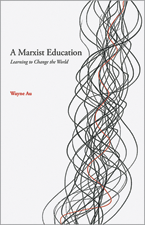
Wayne Au.
Haymarket Books, 018; 305 pp;
ISBN: 978-1-60846-905-5.
By Howard A. Doughty
Wayne Au is still a young man, but he is already a man of accomplishment. Self-consciously working-class, bi-racial and multicultural (he loves hip-hop music and movies), he is an earnest Marxist who, it seems, has talked a constant stream of dialectical materialism in a teaching career that has elevated him from a high school teacher to a fully fledged university professor, mainly at the University of Washington’s Bothell Campus, where he is currently interim dean of diversity and equity. He has won many teaching awards. He has produced a dozen books, three dozen book chapters, over 30 (mostly peer-reviewed) journal articles, and 60 academic presentations since winning his PhD from the University of Wisconsin in 2007.
I mention this to show that he has ample experience upon which to draw for what might otherwise seem like a premature autobiography describing the life of a Marxist educator with a self-imposed obligation to “change the world.”
Dr. Au makes much of the claim that he is a “dialectical materialist.” The phrase, of course, is highly contested. His version might raise some eyebrows. He is clear that, by “dialectical,” he means nothing less than that everything is connected to everything else, that everything is constantly changing, and that external reality strongly influences internal agency. By materialist, he suggests that our conditions determine our consciousness.
He also leaves out a good deal that others might think is essential to Marxism. There is, for example, little attention paid to notions such as “alienation.” He also insists that reductionist, economistic readings of Marx eviscerate the materialist conception of history. It’s complicated.
Au’s interpretation becomes more transparent when he writes about the major figures who have influenced his education in Marxism — chiefly Louis Althusser, Frederick [sic] Engels, Paulo Freire, V.I. Lenin and Lev Vygotsky as well as his personal mentor, the far-famed and justly acclaimed Michael Apple, to whose University of Wisconsin Wayne Au admirably trekked to pursue his doctoral studies.
Most of what Wayne Au discusses might be called “applied Marxism.” His principal interest — theoretically as well as practically — is social justice in education. He is fully invested in the critique of misogyny, racism and socially constructed cultural prejudice and discrimination in all its forms. He has plainly expended enormous effort in attempts to reform educational policies and practices throughout the public school system and to fight effectively against the cancerous growth of the private or “charter” schools that are brutally undermining public education in the United States.
Intense and energetic, he reveals much about his delights: “I love going to radical, leftist rallies and demonstrations. I revel in the energy of the gathering crowds, marvel at the creativity of the signs, and enjoy hearing the chants and songs people come up with.” He also shares his concerns about living a Marxist life at home with his wife and son. (“No dialectics in bed!” his jovial spouse, Mira Shimabukuro, demands.)
It is all quite charming and, for those who may be unfamiliar with Marxism in its many and varied formulations, Wayne Au does a creditable job of explaining his mildly idiosyncratic interpretation in clear and fully comprehensible language. While Americans who have been schooled to fear its demonic powers may recoil from the book’s title, once inside we learn that it is far from the cranky, much less bloody revolutionary doctrine its bitterest enemies make it out to be. Dr. Au has managed to present his personal thinking, political aspirations and social hopes in a thoughtful and unthreatening manner. He is evidently committed to pragmatic tactics and working wholly within the “system” (for example, he appears to be taking little or no part in the current struggle to unionize full-time faculty at his university). Still, there is passion on every page and even a little humour.
A Marxist Education does not meet the standards of depth and experience shown, for instance, in Marshall Berman’s lovely Adventures in Marxism (London: Verso, 1999) which roughly parallels the form, but surpasses the substance of Au’s memoir. However, Au does have plenty of time left in what promises to be a successful career. It will be instructive to see what he reveals in a couple of decades.
____________________________________
Howard A. Doughty is a professor in the faculty of applied arts and sciences at Seneca College.